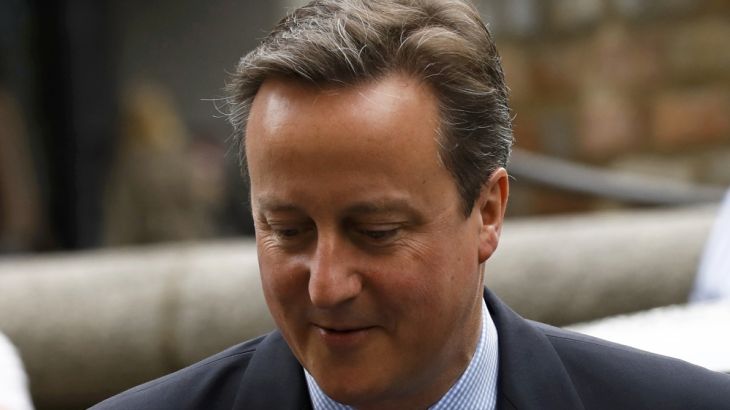Brexit consequences: What happens next?
Now that millions of Britons have decided to leave the European Union, we explore what comes next.

Prime Minister David Cameron has announced that he will resign in October, heeding calls by his rivals that his position was untenable having failed to convince Britons to remain in the bloc.
“I will do everything I can as prime minister to steady the ship in coming months, but I do not think it would be right for me to captain that ship,” Cameron said on Friday morning during a news conference outside 10 Downing Street.
Keep reading
list of 4 itemsNorthern Ireland agreement could end deadlock, restore government
Forced to become British: How Brexit created a new European diaspora
Number of Britons regretting Brexit hits new record high: Survey
“There is no need for a precise timetable today, but we should aim to have a new prime minister in place by the start of Conservative conference in October.”
Brexit: Britain votes to leave EU in historic divorce
On the economy, a plunge in the value of the pound and share prices is expected in the coming days, which would cause the Bank of England to raise interest rates.
Indeed, the British pound fell to its lowest level in more than 30 years during the vote as a victory for Leave looked increasingly likely. Markets also plummeted as a Brexit was confirmed.
Article 50 of the Lisbon Treaty, which guides member states wishing to leave the EU, is a vague map towards the exit door.
Cameron has previously said that in case of a Leave victory, the government would invoke this article immediately and start the long and complicated Brexit process.
What's next for the European Union? #Brexit #EuRefResult
— Al Jazeera English (@AJEnglish) June 24, 2016
“There is no turning back if we leave,” he wrote in a Telegraph article. “If we choose to go out of the EU, we will go out – with all of the consequences that will have for everyone in Britain.”
Once Article 50 is invoked, it could take Britain up to two years to actually leave the EU.
During the two-year negotiation period, EU laws would still apply to the UK.
The UK would continue to participate in other EU business as normal, but it would not participate in internal EU discussions or decisions about its own withdrawal.
Once Article 50 is triggered, the terms of Brexit will be negotiated not by British politicians or diplomats, but by the other 27 nations of the EU.
And, when the members are ready, they will present the British government with a departure agreement on a “take it or leave it” basis.
Negotiating Brexit
With the stability of the global economy at risk, the European Central Bank is widely expected to make a statement to reassure markets on Friday.
EU President Donald Tusk, European Commission chief Jean-Claude Juncker, European Parliament head Martin Schulz and Dutch Prime Minister Mark Rutte, whose country holds the six-month EU presidency, made a joint statement in Brussels.
World reacts: Britain votes to leave the EU
“This is an unprecedented situation, but we are united in our response,” they said. The four said they expected Britain to “give effect to this decision … as soon as possible,” by enacting article 50 of the Lisbon treaty.
European affairs ministers will meet in Luxembourg to lay the groundwork for Brexit talks at the EU summit on June 28-29. Talks start at 12:30 GMT.
Foreign ministers from the EU’s six founding countries – France, Germany, Italy, Belgium, the Netherlands and Luxembourg – are expected to meet on Saturday in Berlin, according to European sources.
French President Francois Hollande will meet German Chancellor Angela Merkel next week to discuss “European initiatives”.
The Merkel-Hollande meeting could be the occasion to announce plans for a long-rumoured Franco-German initiative on a better integrated defence and security strategy for Europe.
The leaders are seeking to use the plan to dispel doubts on the EU project unleashed by the British vote campaign.
Watch: What’s the future of the UK in the wake of Brexit?
On Monday the European Commission’s top officials, who are nominated by the EU’s member states, will begin mapping out the long road to an official Brexit at an extraordinary meeting in Brussels.
MEPs have also called for an extraordinary session of the European Parliament to be held in Brussels on Monday in the case of a Brexit vote.
‘Brexit summit’
The 28 EU leaders – still including Cameron – will meet on June 28 and 29 in Brussels to digest and debate the results of Thursday’s Leave vote.
It was originally due to be held on June 23 but was postponed after the British referendum date was announced.
On July 1, the Netherlands hands over the EU’s six-month rotating presidency to the relatively inexperienced Slovakia, which now must lead the negotiations towards Brexit.
Britain had been due to take the helm at the end of 2017 but will now give that up.
EU civil servants will delay summer holidays to begin the painstaking legal work to bring about Brexit.
The official British divorce from Europe would take at least two years. But EU president Donald Tusk has warned that the whole process of negotiating trade and immigration deals with a non-EU Britain could take seven years in all.
Will house prices fall in the UK and EU after Brexit?
Watch: Will Brexit hurt the UK and Europe?
Brexit: Making Britain great again?